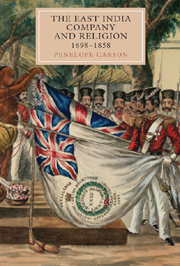Book contents
- Frontmatter
- Contents
- Acknowledgements
- Note on Hinduism
- Abbreviations
- Map of India
- Introduction
- 1 A Christian Company?
- 2 The East India Company, Britain and India 1770–1790
- 3 The 1790s: A Time of Crisis
- 4 The Pillar of Fire Moves Forward: The Advent of British Missionaries 1793–1806
- 5 The Wisdom of the Serpent and the Innocence of the Dove: The Vellore Mutiny and the Pamphlet War 1806–1808
- 6 Troubled Years 1807–1812
- 7 Battle Lines Drawn: Missions, Dissent and the Establishment
- 8 The 1813 Renewal of the Company's Charter: The Religious Public Takes on the Company
- 9 A Turbulent Frontier: The Company and Religion 1814–1828
- 10 A New Dawn? The Era of Lord William Bentinck 1828–1835
- 11 Between Scylla and Charibdis 1836–1858
- Conclusion and Epilogue: Strangers in the Land
- Appendix 1 Presidents of the Board of Control
- Appendix 2 Governors-General and Governors of Madras and Bombay
- Appendix 3 Aide Memoire to Names
- Appendix 4 ‘The Pious Clause’
- Bibliography
- Index
- WORLDS OF THE EAST INDIA COMPANY
8 - The 1813 Renewal of the Company's Charter: The Religious Public Takes on the Company
Published online by Cambridge University Press: 05 February 2013
- Frontmatter
- Contents
- Acknowledgements
- Note on Hinduism
- Abbreviations
- Map of India
- Introduction
- 1 A Christian Company?
- 2 The East India Company, Britain and India 1770–1790
- 3 The 1790s: A Time of Crisis
- 4 The Pillar of Fire Moves Forward: The Advent of British Missionaries 1793–1806
- 5 The Wisdom of the Serpent and the Innocence of the Dove: The Vellore Mutiny and the Pamphlet War 1806–1808
- 6 Troubled Years 1807–1812
- 7 Battle Lines Drawn: Missions, Dissent and the Establishment
- 8 The 1813 Renewal of the Company's Charter: The Religious Public Takes on the Company
- 9 A Turbulent Frontier: The Company and Religion 1814–1828
- 10 A New Dawn? The Era of Lord William Bentinck 1828–1835
- 11 Between Scylla and Charibdis 1836–1858
- Conclusion and Epilogue: Strangers in the Land
- Appendix 1 Presidents of the Board of Control
- Appendix 2 Governors-General and Governors of Madras and Bombay
- Appendix 3 Aide Memoire to Names
- Appendix 4 ‘The Pious Clause’
- Bibliography
- Index
- WORLDS OF THE EAST INDIA COMPANY
Summary
Next to the Slave Trade, I have long thought our making no effort to introduce the Blessings of religious and moral improvement among our subjects in the East, the greatest of our National crimes.
(William Wilberforce)The Parliamentary Battle
BY JANUARY 1813 Evangelicals were ‘all on the alert to besiege Government and perhaps Parliament for a clause in favour of missions or for liberty to send missionaries, and security when arrived’. The Company had not been idle either and was determined to hold on to its right to determine who should enter its territories. The Baptist leaders waited on Lord Liverpool early in February. In distinct contrast to his reception of the CMS deputation in July 1812, Liverpool's words gave little comfort. Church Evangelicals had been conciliatory and had stressed their loyalty to the Established Church. Dissenters demanded more and threatened Liverpool with a public petitioning campaign. It also seems likely that by this time the East India Company had lobbied him to ensure that he did not weaken on the matter of licences. Liverpool was well informed about events in India. He was also related to Prendergast and Ricketts, two of the missionaries' staunchest opponents. Liverpool pointed out some of the Baptist indiscretions. He made it clear that he believed, along with most Company officials, that ‘British continuance in India depended upon Indian opinion’ and that Britain kept its dominion there ‘just so long as the natives think themselves unable to drive us out’.
- Type
- Chapter
- Information
- The East India Company and Religion, 1698-1858 , pp. 130 - 150Publisher: Boydell & BrewerPrint publication year: 2012



